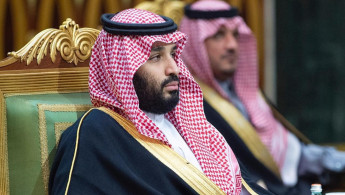Follow us on Facebook, Twitter and Instagram to stay connected
Exiled Saudi dissident Omar Abdulaziz targeted by Riyadh, Canada warns
Omar Abdulaziz, who is in exile in Canada, has been warned that he may be a target of Saudi Arabia.
4 min read
The Canadian government warned Omar to protect himself [Getty]
A Saudi activist and blogger who was once close with murdered journalist Jamal Khashoggi and is living in exile in Canada has been warned by authorities that he could be a "potential target" of Saudi Arabia.
Omar Abdulaziz, a prominent 29-year-old activist with over half a million followers on Twitter was contacted by the Canadian government, who told him that they had credible information about an alleged plan that could harm him.
The activist, who was close with murdered Washington Post journalist Khashoggi, believes that in speaking out against the Saudi government’s use of Twitter bots as a propaganda tool, he has become a target of the government, the Guardian reports.
"[The Canadian authorities] received some information regarding my situation that I might be a potential target," Abdulaziz told the Guardian.
"MBS and his group or – I don’t know – his team, they want to harm me. They want to do something, but I don’t know whether it’s assassination, kidnapping, I don’t know – but something not OK for sure," he said, referring to the Saudi Crown Prince Mohammed bin Salman.
In 2018, Citizen Lab researchers at the University of Toronto told Abdulaziz that his phone had been hacked by a network they believed to be connected with Saudi Arabia.
At around this time, Khashoggi, with whom Omar had been in close contact, was murdered in the Saudi consulate in Istanbul.
Shortly after, members of Abdulaziz’s family and friendship group were arrested in the Kingdom.
This is the first time Abdulaziz has been contacted directly by the Royal Canadian Mounted Police (RCMP), and his attorney confirmed that the warning by the government was "different" than other correspondences.
|
"It was formal and conveyed a clear sense of urgency and advice to take precautions. It felt more credible and more concrete."
In November 2019, one year after the killing of Khashoggi, Abdulaziz penned an op-ed in The Washington Post with the headline "Saudi spies hacked my phone and tried to stop my activism. I won’t stop fighting".
In the piece, he recalled that the Justice Department had charged two former Twitter employees with spying for Saudi Arabia by accessing the company’s information on dissidents – Abdulaziz had been "one of the targets".
"It’s all been part of a coordinated campaign of harassment.
"Saudi Arabia, using spyware sold by the Israeli company NSO Group, hacked my phone to read my messages with Jamal, with whom I was working to identify and combat Saudi trolls on Twitter, which we called the 'electronic bees'", he wrote at the time.
“We were working together to organise an army of volunteers to counter them.”
He added that the rise of Mohammed bin Salman as crown prince in 2017 turned Twitter, which had been relatively freely used in Saudi Arabia, into a propaganda machine.
"That all changed with the rise of MBS. Saudi Twitter gradually morphed into a propaganda platform, with the government deploying trolls and pressuring influencers to amplify its messages," Abdulaziz wrote.
"More than 30 influencers told me that the Saudi government blackmailed them with material obtained by hacking their phones. They were given two options: Tweet propaganda or have your private content, including pictures, released on Twitter."
 |
| Khashoggi was murdered [Getty] |
Khashoggi murder linked to MbS
Turkish prosecutors have charged 20 suspects including two former top aides to Saudi Crown Prince Mohammed bin Salman over the brutal 2018 murder of Riyadh critic Jamal Khashoggi.
Prosecutors accuse Saudi Arabia's deputy intelligence chief Ahmed al-Assiri and the royal court's media tsar Saud al-Qahtani of leading the operation against Khashoggi and giving orders to a Saudi hit team.
Khashoggi, 59, a commentator who wrote for the Post, was killed after he entered the Saudi consulate on October 2, 2018, to obtain paperwork for his wedding to Turkish fiancee Hatice Cengiz.
The Saudi insider-turned-critic was strangled and his body cut into pieces by a 15-man Saudi squad inside the consulate, according to Turkish officials.
His remains have never been found despite repeated calls by Turkey for the Saudis to cooperate.
Riyadh insists he was killed in a "rogue" operation.
But the CIA, a UN special rapporteur and Ankara have directly linked the Saudi crown prince to the killing, a charge vehemently denied.





 Follow the Middle East's top stories in English at The New Arab on Google News
Follow the Middle East's top stories in English at The New Arab on Google News
![The UAE is widely suspected of arming the RSF militia [Getty]](/sites/default/files/styles/image_330x185/public/2024-11/GettyImages-472529908.jpg?h=69f2b9d0&itok=Yauw3YTG)
![Netanyahu furiously denounced the ICC [Getty]](/sites/default/files/styles/image_330x185/public/2024-11/GettyImages-2169352575.jpg?h=199d8c1f&itok=-vRiruf5)
![Both Hamas and the Palestinian Authority welcomed the ICC arrest warrants [Getty]](/sites/default/files/styles/image_330x185/public/2024-11/GettyImages-2178351173.jpg?h=199d8c1f&itok=TV858iVg)